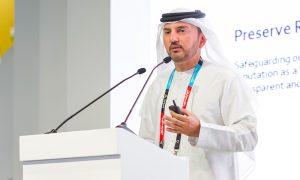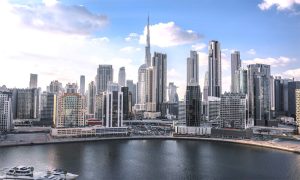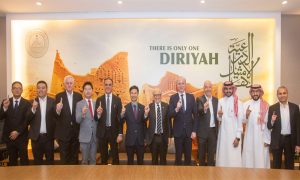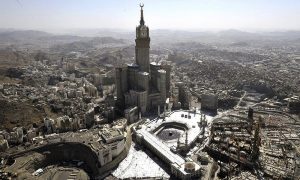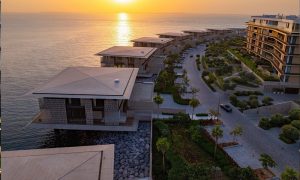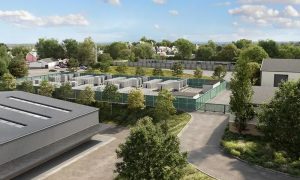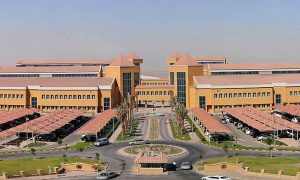The Met Reborn
Big Project ME gets an exclusive tour of the massive Habtoor City complex that is replacing the old Metropolitan hotel on Sheikh Zayed Road, Dubai

For most of the 1980s and 1990s the Metropolitan Hotel on Sheikh Zayed Road was considered to be one of Dubai’s most recognisable landmarks. Helped in no small part by being one of the first hotels in the city, the Metropolitan became a gathering point for expats from all over the world, who were working in a city and country that was yet to undergo the prodigious rate of development that is now taken for granted. As Dubai continued to grow and expand, the 33-year-old hotel became something of an anachronism as newer and glitzier rivals sprung up across Dubai and down Sheikh Zayed Road. With Dubai Marina and Jumeirah Lake Towers growing in size and becoming more popular with tourists and residents, a number of hotels opened branches there as well, further intensifying the pressure on the Al Habtoor Group owned property. The result was that the Metropolitan became displaced in an ultracompetitive marketplace and soon fell by the wayside, unable to attract sufficient clientele to be financially viable. Dwarfed by the world’s tallest hotel, the gigantic JW Marriot Marquis, it was eventually decided to bring the shutters down on what was once a Dubai icon. So it was in May 2012, following an extravagant send off, the hotel’s owners decided to demolish the entire property, levelling the whole hotel and bringing to a close nearly three decades of memories and stories. However, this was only phase one of an ambitious plan by the Al Habtoor Group, a plan that will revitalise the site and see the development of a massive complex that will house three top of the line hotels, a state of the art ‘Water Theatre’ and gardens modelled on the ones in Versailles. Martyn Wild, the projects director for the Al Habtoor Group, explains that the three new hotels due in 2015 will all be managed by the Starwood Hotels and Resorts, with around 1,600 rooms available to guests. “There are three hotels, there’s the Westin, which is a business hotel. That’s the big one with 1,000 rooms,” he tells Big Project ME during a site visit to the project. “The St Regis is a very upmarket, six star hotel offering, with about 250 rooms. The rest of the rooms are in the W. The W is something different. I suppose the target market (for it) is young, affluent people. It’s everything you don’t expect.” “I think it’s something like July, September and November for the openings of the hotels, they’ll all open before the end of September. I think it’s the St Regis first, then the W and then the Westin, which is the big one,” he adds. Furthermore, the complex will see the development of three levels of basement car parking, which will stretch out under the gardens and avenue that lead up to the St Regis hotel. In addition, the complex will be built on a podium that will stretch across nine levels, housing mezzanine and service levels, along with parts of the hotel. “The site is 92,903m2, and the gross floor area is 357,000m2. There are three basements over the whole site. At the end of the site (the entrance) we’re not able to build above ground level. That’s because of government zoning. So we have parking only, but on top of the parking, we’ve got this classical type garden, a Versailles type garden, with a grand entry up to the hotel, with trees on both sides and the St Regis at the end,” Wild explains, painting a vivid picture. “This is a classy, six star hotel. It’s all period, the building and the inside. It feels like a country house rather than a hotel. It’s very intimate and highly serviced, this is the jewel in the crown. So all the building is at the (north) end. And again, there are three levels under this, and it’s a combination of parking and back of house.” Holding more than 3,000 parking spaces, the vast basement levels will also hold kitchens, laundries and other hotel services in them, Wild says. “We have a podium that’s actually nine levels high. Some of those levels are mezzanine levels, some are service levels, but it’s a significant podium. The St Regis is in the front of that podium and the bottom of the Westin and W hotels are also in that podium,” he explains. Designed as two towers, the Westin hotel will go up to 56 floors, while the W will go up to 45 floors. The St Regis will have six public levels plus the basement. The top of the podium will also have landscaped areas, pools and other facilities. Although the hotels will take up the bulk of the complex, the main attraction of the complex will be a $15 million dollar ‘Water Theatre’ that will host an extravagant and elaborate Cirque de Soleil inspired show, similar to ones in Las Vegas, Macau and China. Guests will enter the theatre through the W hotel, walking through an atrium that will be populated with restaurants and retail outlets that will be managed by the Al Habtoor Group. “The theatre is something a bit unusual. It’s more of a show theatre, it’s certainly not a Shakespeare-type theatre. The producer is a guy called Franco Dragone. He started Cirque De Soleil, left it after it was established and created his own company called Franco Dragone Entertainment Group and he’s done two or three in Las Vegas, one in Macau, he’s doing one in China and he’s doing ours next,” Wild enthuses. “It’s a more elaborate Cirque de Soleil, it’s like it times five. We’ve designed a building around the show. Franco Dragone Productions design the show, give us the concept and we design and build the building around the show. It’s specific to the show, and it may run for ten or 15 years. So it’s a long running affair.” “The auditorium 1,400 seats and it’s a water show. So the stage is a pool. Some of it is solid, but the rest of it is a pool and the seats are built around that. The auditorium is 37 m high, and you get performers diving from the top, into the water, with boats coming in. It’s extremely elaborate and I think it’ll be extremely successful in Dubai,” Wild says, adding that the first show is pencilled in for April 2016. Despite his excitement about the water theatre project, Wild does concede that it has posed the biggest challenge for his contractors. Although there are only 44 months for the entire project to be completed, he remains confident that the target date will be met, thanks to the expertise of the site’s main contractor, Habtoor Leighton Group. “A problem that runs through the entire project is the timescale. 44 months to complete a project like this is challenging. So the design and construction are happening simultaneously, so a very tight relationship between the consultant, designer and contractor is absolutely essential,” Wild asserts. “This is what we’ve got, very good communication and cooperation. It’s about creating a culture in the project where the overall project is the most important. Each person’s individual requirements have to be put second. The first priority is the project.” “To get people in that state of mind is not easy, but this is what we’ve done. We’ve got a very good, inter-company team feeling, and this is the key to any project. It’s about creating a team, instead of individual companies operating independently, if you can generate that team culture, you’re half way there,” he explains. “That’s what we’ve done here. There isn’t the fear that the next problem is going to hurt us. The next problem, we’ll solve like the last problem, and the problem before that. That’s not easy to do. At the beginning, people are nervous and suspicious, but eventually trust builds and builds, till eventually, if one person in the team falls down, someone will support them instead of exploiting a problem someone else has got. At the end of the day, if one of the team fails, then we all fail. It doesn’t matter who it is, the project fails and we simply won’t allow that to happen.” He admits however, that building the water theatre will be a challenge, especially from an MEP perspective, thanks to the unique challenges it poses. “MEP isn’t a walk in the park, but everybody’s done hotels before (so they know what to do). It has to be done properly, but the theatre is where the real challenge is (for this project). You’ve got water jets that are 20-30m high, the pumps and pipes to send water, huge amounts of water. The pool is emptied and filled before your eyes. The services that deal with that are unusual. Now the theatre consultant helps with that, but the team has to be on the ball to deal with it as well,” says Wild. With a construction schedule that will run 24/7 and a labour force that will hit close to 6,000 once construction hits its peak and it all sub-contractors start work, Wild cannot stress enough how important it is to have a main contractor that is well versed in dealing with massive projects such as the Habtoor Island complex. “They’re a company with international expertise, and they bring a lot of knowledge to this project,” he says. “The management of time and resources is at the centre of that knowledge. You can bring in 6,000 people and the productivity can still be negligible if they’re not managed properly. The right number of supervisors, the distribution and the sequence of work and so on, this is real contracting expertise.” “From the contractor’s point of view, that’s mainly taken care of by the consultants and the design work. It’s the organisational skills that are key to a contractor’s performance, and this they have. Managing a geographically large space, with a lot of people, a lot of subcontractors, the number of specialists is astronomical. Managing all those people is the real challenge for the contractor, and they have the expertise for that,” Wild insists. With between 50 to 75 subcontractors set to be hired on the project, these attributes will certainly be needed. The selection process is set to be rigorous, with Al Habtoor seeking out views from the main contractor and consultant on the project. An initial ‘long list’ is whittled down to a select few, who are then invited to tender and have their bids assessed. With construction contracts for the hotel worth $544.5 million there is clearly a lot riding on these projects for the Habtoor Group. However, if Wild is feeling the pressure, he certainly isn’t showing it. “We’re doing the superstructure at the moment, we’re up to ground level in some places. The superstructure is well underway and we’ve just appointed the MEP contractor, who is beginning work.” “Next will be the façade contractor, so we’ve done the foundations, then the substructure in the basement, now we’re on the superstructure above ground,” he says, adding that the completion dates will be staggered, despite all the working happening at once. Clearly then, Wild’s initial point about choosing the right team is extremely valid. With so much work to do on what is effectively four construction sites in one, all within 44 months, having a team you can trust and rely on is critical, a viewpoint he readily agrees with. “If you want to do something like this well, and quickly, then you’ve got to buy the right expertise. You can’t short-change that process,” he insists.
